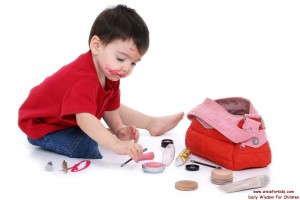Receive your FREE Parenting Advice through this blog. Simply ask Bob Lancer your question and receive his Lancer’s Answer in this blog.
Wisie Members: Please feel welcome to share your views in this blog regarding any of the Wisie videos, and to ask questions about how to make the most of them.
A childâs problematic behavior often stems from a parent misreading the child.
Parenting as effectively as possible produces the best child behavior results. It requires clear and accurate recognition of our childrenâs present need for appropriate behavior.
To know what our children need from us to avoid developing a behavior problem, or to improve their behavior, we need to be very aware in the present moment.
Getting too caught up in our daily tasks, we may pay superficial attention to the child, causing us to overlook the childâs subtle signs of need, like a sadly drooping face or an aggressive clenching of a fist.
Destructive behavior that seems to come âout of the blueâ could often have been prevented if the parent had paid closer attention beforehand to recognize what the child required BEFORE she began throwing a tantrum, BEFORE he began kicking the pet, BEFORE he began biting his sibling.
Perhaps the childâs deepest, most fundamental need is for us to demonstrate CONSCIOUS parenting.
Alert, conscious observation of the child in the present reveals the true self of the child.
And that âselfâ becomes the best form of guidance for parents, showing us just what this particular child needs at this particular time for great child behavior and positive child development.
When we fall into habitual, âmechanicalâ unconscious parenting, even when we are with our children we are not really there, and they sense it.
To gain our deeper involvement they may resort to inappropriate, or even outrageous behavior, even when they âknow betterâ.
Behavior problems manifest as our parental responses mismatch the needs that our children express.
Conscious Parenting Tips:
- Spend time every day simply calmly, consciously observing your child.
- As you apply this parenting tip, look for your childâs subtle physical signs that express her mood, attitude, and feelings in general.
As you practice more CONSCIOUS parenting, you will:
- Experience deeper and more accurate understanding of your child.
- Be better at predicting when your child is headed toward behaving improperly.
- More effectively meet your childâs need for great child behavior.
Feel welcome share in this blog your experience of applying these Conscious Parenting Tips, and any questions that you have about your childâs behavior.
Receive your FREE Parenting Advice through this blog. Simply ask Bob Lancer your question and receive his Lancer’s Answer in this blog.
Wisie Members: Please feel welcome to share your views in this blog regarding any of the Wisie videos, and to ask questions about how to make the most of them.





 button.
button. 


































